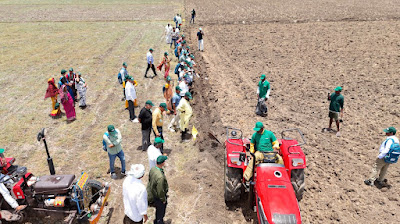Progressive men and women farmers, SPs, and representatives from non-government organizations from Odisha, Andhra Pradesh, Chhattisgarh, and Telangana participated in a hands-on demonstration of mechanized direct-seeded rice. The objective was to allow stakeholders to observe and experience advanced agricultural practices.
The DSR practices in the comprehensive demonstration included the application of pre-seeding herbicides, field preparation for dry DSR, soil mulching, basal phosphatic fertilizer application, drill seeding, and planking, spraying of pre-emergence herbicides, and mechanical weeding.
The activity was held on 02-08 August under the Precision Direct-Seeded Rice-based Diversification Systems for Transforming Labour Requirement, Yields and Profitability of Smallholder Farmers in Odisha (IRRI-GoO-DSR-Odisha) Project. The collaborative project between IRRI and the Odisha Government (GoO) aims to showcase mechanized DSR systems and their successful implementation at farm levels.
Sugandha Munshi, a scientist at the International Rice Research Institute (IRRI), highlighted the significance of firsthand experiences in learning and sharing knowledge about mechanized DSR. This activity is crucial in building confidence among farmers and promoting wider adoption of the technology, according to Dr. Munshi
Praanadhaara Organized Agro-forestry Private Ltd., a leading NGO in mechanized rice farming, facilitated the event. Praanadhaara has been instrumental in expanding mechanized DSR adoption and its potential benefits for farmers in Andhra Pradesh. The organization has made significant progress and impact with more than 1.5 lakh acres under mechanized dry-DSR in the 2024 kharif season.
Praanadhaara Director Kurra Pundarikashudu emphasized that DSR's efficiency and cost savings could reach about INR 3.0 crore per kharif season for 6,000 acres.
Ashok Yadav, coordinator of the IRRI-GoO-DSR-Odisha Project, commended the impressive scale of mechanized DSR in Andhra Pradesh and Guntur Districts. Dr. Yadav encouraged replicating the practices in Odisha and looked forward to closer collaboration with Praanadhaara to tailor DSR technology to local conditions.
The positive feedback and insights from the activity indicate the potential of mechanized DSR to transform rice cultivation in Odisha and beyond. Encouraged by the successful outcomes, the Department of Agriculture and Farmers Empowerment Principal Secretary Arabinda Kumar Padhee and Dr. Virender Kumar, Deputy Head -
Sustainable Impact Department, and Research Leader - Climate-Resilient Farming Systems, IRRI, emphasized the need to replicate and intensify similar efforts in Odisha.
The activity also included a delegation from Malaysia led by Rais Hussain. Dr Hussain discussed recent developments in rice cultivation and extended an invitation to implement mechanized rice cultivation on 2,000-ha land in Malaysia. This collaboration is expected to bolster bilateral agricultural ties and advance mechanization in rice cultivation between India and Malaysia.
Contributors: Ashok Kumar (Coordinator, IRRI-DSR-Odisha Project), Kurra Pundarikakshudu (Director, Praanadhaara) and Sugandha Munshi (Senior Associate Scientist, IRRI)
###
Learn more about IRRI (www.irri.org) or follow us on social media and networks (all links down the right column).




No comments:
Post a Comment